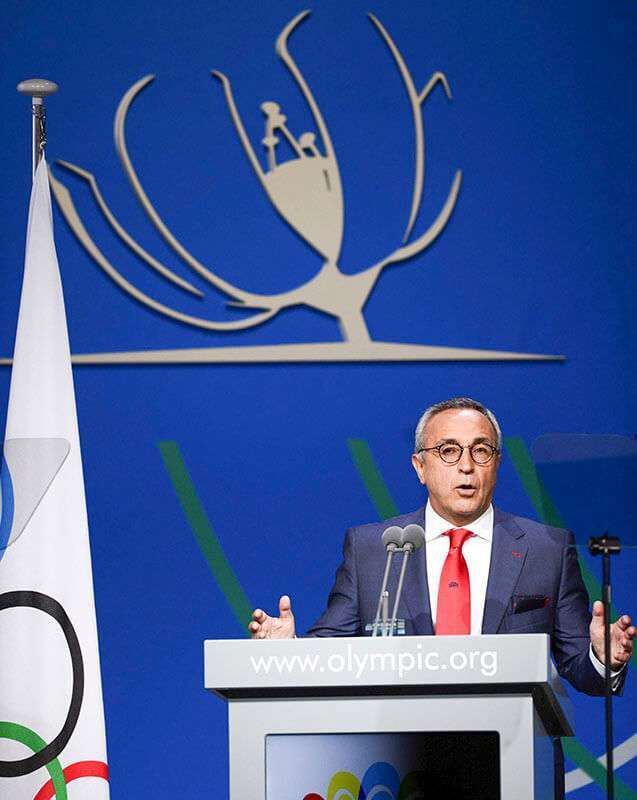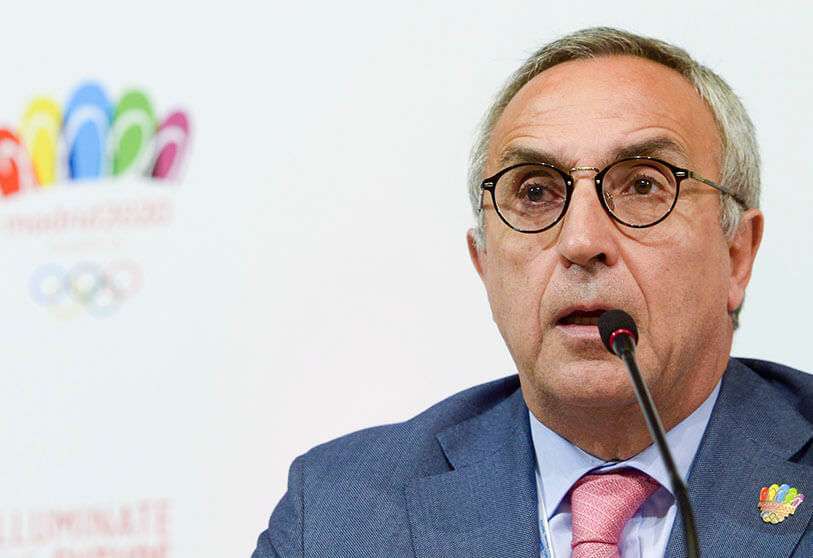Alejandro Blanco: "Olympic athletes will not suffer any economic loss, we have ensured the aids until Tokyo 2021"

Alejandro Blanco (Orense, 1950) is one more confined in a pandemic that does not understand neither social classes nor jobs. The coronavirus has taken over the vast majority of sporting events in 2020. Also the Tokyo Summer Olympics. The president of the Spanish Olympic Committee (COE) is teleworking at the same pace as in his office. He is still in touch with the Olympic family, is aware of everything that surrounds his athletes and attends Atalayar with a positive thought and a slogan, "we will get out of this".
What is the COE's president day-to-day life like?
I spend it making video conferences and phone calls. I'm in contact with presidents, athletes, coaches... Many hours of work with the difference that now you have to be at home. The activity is intense and you spend it waiting for this situation to end soon so as to start running... never better said.
Did you lose sleep over the fact that the IOC did not decide to postpone Tokyo 2020 and that Spanish athletes had to attend games without being able to train sufficiently? Did you consider drastic solutions?
We were concerned at the time, of course. When we had the first videoconference meeting with the European Olympic Committees (EOC) and President Thomas Bach, there were very few countries in the situation that Spain was in. However, out of loyalty to Thomas Bach and the IOC (International Olympic Committee) and the fact that their decisions would be accepted one hundred percent, I raised the problem of Spanish athletes who were already confined and could not leave their homes to train. If you can't train it is difficult to compete. The pandemic spread exponentially both in different countries and in the number of people affected. Once the World Health Organization (WHO) issued the final report that it could not control the pandemic by July, the IOC and the organizing committee in Japan made the decision they had to make. Everything went its way. There was concern, but when it was said that the Olympics would be rescheduled and a new date would be set, we already knew that it would not be this year, 2020. It would give our athletes time to recover and train to compete their best.
Why did it take so long for the IOC to make the decision? Is it possible to tell if other scenarios were considered?
I do not have an answer to the second question. The first question is that the IOC took as long as all the scientists, doctors, the WHO and the organizing committee took to say that the Olympic Games cannot be organized. They are the biggest event a country can organize. Not only in terms of sport. Many actors are involved: the organizing committee, the IOC, committees from all over the world, international federations, television stations, sponsors... you don't make such an important decision by listening to only one of the actors. The IOC did what it had to do and made the decision as soon as it had all the data on the table.
Once the date of the next Olympic Games has been set, have you noticed a certain tranquillity in the athletes?
Absolutely. The sportsmen and sportswomen are as restless as we all are in a state of alarm. They are respecting one hundred percent the rules set by the government, as it could not be otherwise. Now, I hope to see them once the state of alarm is over and they can go out and train. They will eat the world. There will not be enough hours of training a day for them to be able to fill the debt they have right now for being at home. Because, even though you can do things at home, it's not even one-tenth of the activity you do in a regular day of training.

What does another year in the life of an Olympic athlete mean?
I wouldn't say one more year. You dream for four years of 24 July 2020 and suddenly this cycle is 23 July 2021. It's one more year of preparation, work, projects, planning. It would not be so complicated, in general, if it were not for this situation that disrupts everything. Athletes, coaches, club officials, referees and managers have never been so paralysed in their lives as they are at home, confined to their homes and unable to work in their countries. That makes it harder for one to do so and less so for others. Spain is already in the Olympic Games. More than 200 athletes are qualified, the only thing that will happen is that this period instead of being three or four months will be a year and a few months. I trust that they will all endure and arrive in perfect condition at Tokyo 2021.
Has the COE been affected by the postponement? Economics, logistics, sponsorship...
Everyone is going to suffer from the economic side of this pandemic. Now we have to wait to resume activity and see the consequences before we can evaluate them. We are realistic and optimistic. Once the health issue is solved, we will solve the rest, which will be much easier.
This year of delay, does it take a lot of extra paperwork to achieve classification in some sports?
It changes the final part. In many sports I had already finished the classification. There are still some pre-Olympic teams and some qualifying tournaments in individual sports. The international federations are adapting the schedules and once the athletes can compete, they will do those few remaining tests to close the final classification. We already have 210 and we hope to go with 300. There are athletes who are already in the first positions of the ranking of their sport, but that classification is not closed and that is why we do not count them yet. Athletics, for example, closes very late. But the Spanish athletes will be between 300 and 310.
Will Olympic athletes with more limited resources have a hard time until 2021 because of grants, sponsorships...?
We have secured both the ADO program and the Podium, the help of UCAM, the Trinidad Alfonso Foundation. Those are the four most important projects along with LaLiga. The grants will continue and there will be no financial loss of any kind. Everyone must be reassured. First, we will think about health. When it's all over, they will return in the same condition without any problem.
Will the age be a problem or will the age of the athletes be respected in 2020?
It has been agreed that the age of the footballers in 2020 will be kept. Three U-24 players can be called up instead of the U-23. I am watching all the rules and nothing has been changed.
Are there any Olympic sports plans for the summer? Is anything symbolic going to be done?
Once all this is over, we'll have more meetings to assess everything. It depends on when the competitions can start. We don't know when the leagues and championships will end. We are waiting to take everything back one hundred percent. I cannot tell you what is going to be done because this situation is not over.

Are you worried about the EOC election? Will it be in 2022?
That's the last of my worries. We're moving into the Olympic years. The election is the year after the Olympics. Let's see what the IOC has to say.
Have you been particularly moved by the attitude of the Olympic athletes sending messages to society at this difficult time?
I certainly have. We had a meeting with some of the most important Olympic athletes and we had the feeling that they were really out of the ordinary. Olympic athletes, medallists who could train next to their house without anyone around because they live next to the training site and they have said that they should not be training while people are at home. I think it's another sign that we have the best athletes in the world. But they are also people who equal or exceed their sporting value. They are supportive, responsible to society and have given us a great example.









